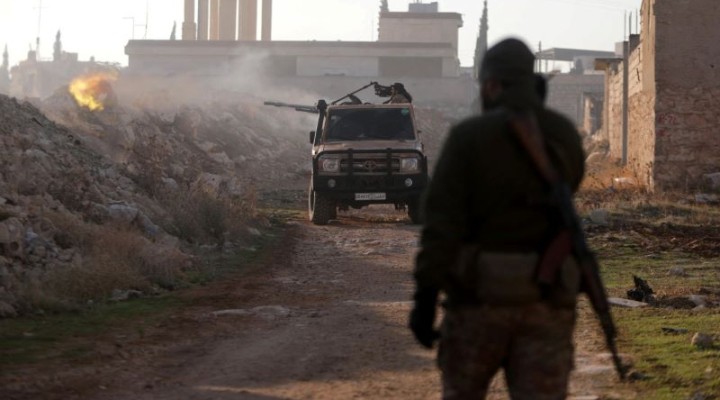The assault on Aleppo

US, Israel, and Turkey launch renewed regime-change bid in Syria
The offensive launched by Syrian opposition factions led by Hayat Tahrir ash-Sham (the Nusra Front) did not come out of the blue. It is part of a US-Israeli-Turkish scheme that took several months, if not longer, of secret planning in sealed rooms.
We are witnessing the start of a re-run of the 2011 scenario scripted by the same parties involved in the current attack on Aleppo, in a manner that took the Syrian authorities and their Russian allies by surprise. The assailants seized control of more than half the city in less than a day, while Syrian army units made a tactical withdrawal to avoid heavier losses and prepare for a counter-offensive to eject them, as happened several years ago.
The ‘green bus’ days — transporting defeated gunmen to rebel-held areas — seem set to recur in the weeks or months ahead.
The scenario unfolding in Syria is a copy of the one applied by the US to Iraq starting in 1991: a suffocating starvation blockade followed twelve years later by a military invasion and occupation leading to regime-change. But this may not be applicable in today’s Syria, which has a strong army, a loyal popular base, a strategic ally in Vladimir Putin’s Russia, and an Axis of Resistance led by a militarily powerful (and maybe nuclear-capable) Iran with a variety of armed allies in Lebanon, Iraq, Yemen, and Occupied Palestine. The replay can therefore be expected to end in failure, as the original did.
Israeli Prime Minister Benjamin Netanyahu is directly involved in this assault. He revealed that when he warned Syrian President Bashar al-Asad that he was “playing with fire” by resisting US and Israeli pressure and threats to prevent the transit of Iranian military supplies to Hezbollah in Lebanon. Israel’s bombing of Lebanon’s border crossings with Syria to destroy them was part of this scheme.
The Syrian army’s fightback will not only be in defence of its country’s sovereignty and territorial integrity, but also of Russia and Iran and their strategic interests. Netanyahu has said repeatedly that he only agreed to a cease-fire in Lebanon to concentrate on confronting Iran and crushing all resistance in the Gaza Strip.
Turkey’s foreign minister and former intelligence chief Hakan Fidan insisted at a press conference on Saturday that his country has no connection to the current fighting in the Aleppo and Idlib districts in northern Syria. But such assurances fail to convince anyone. None of the factions taking part in the assault could fire a single bullet without the knowledge and approval of Turkish intelligence, which nurtures and arms them and provides them with protection.
Whatever the scale of Turkey’s involvement, it could backfire against President Recep Tayyip Erdogan and his government, Turkey’s national security, and its relations with mighty neighbour Russia.
The attack may not be a violation of the Astana agreements and Sochi understandings which Putin signed in person, as they provided for the removal of all ‘armed groups’ only from Idlib and its countryside. But Sunday’s joint Russian and Syrian airstrikes targeting these groups, reportedly killing some 500 of their members , could be the prelude to a Russian-Turkish military confrontation.
Erdogan makes no secret of his designs on Aleppo in Syria and Mosul in Iraq, which he deems to be Turkish lands. He wants to eject Syrian government forces from Aleppo and instal his clients in the armed Syrian opposition as the city’s rulers, as he did in Idlib and other parts of northern Syrian occupied by Turkish forces, with the aim of removing as many Syrian refugees as possible to these areas.
There are reports that the Nusra Front has been using Ukrainian drones in the offensive against Aleppo under the supervision of Ukrainian military advisors. If verified, this would cross all Russia’s red lines and expose Turkey’s clandestine role in the Ukraine war.
When I met with President Asad for nearly five hours at his home in May 2023, he affirmed he had no trust at all in Erdogan and would not meet with him until all Turkish forces were withdrawn from Syrian territory — and that he would never drop that condition under any circumstances. I am not surprised at his refusal to heed Erdogan’s calls for reconciliation and a face-to-face meeting under Russian auspices before there is a clear commitment, guaranteed by Moscow, to withdraw from Syrian territory.
This renewed US-Israeli-Turkish bid to dismember Syria and change its regime — this time in the context of Netanyahu’s plans for redrawing the map of the region under Israeli tutelage — has little to no chance of succeeding. Iran and Russia are unlikely to stand idly by, for the simple reason that a Syrian defeat would be a prelude to the defeat of the regimes in Iran, Russia, and maybe also Iraq.
 TheAltWorld
TheAltWorld 
Ron Chandler
None of Syria is Turk. On the other hand, Alexandretta in Turkey, is a Syrian city. One day…